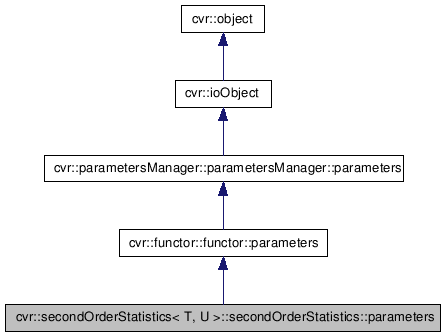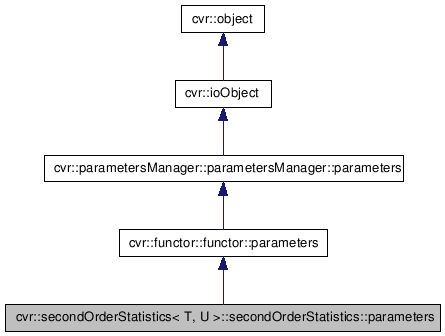

|
last update 20 Sep 2009 |
|
#include <cvrSecondOrderStatistics.h>


Public Member Functions | |
| parameters () | |
| parameters (const parameters &other) | |
| ~parameters () | |
| parameters & | copy (const parameters &other) |
| parameters & | operator= (const parameters &other) |
| const std::string & | name () const |
| virtual bool | write (ioHandler &handler, const bool complete=true) const |
| virtual bool | read (ioHandler &handler, const bool complete=true) |
| virtual parameters * | clone () const |
| virtual parameters * | newInstance () const |
Public Attributes | |
| eDataRepresentationType | dataRepresentationType |
| eVarianceType | varianceType |
| bool | useCorrelation |
| cvr::secondOrderStatistics< T, U >::secondOrderStatistics::parameters::parameters | ( | ) |
| cvr::secondOrderStatistics< T, U >::secondOrderStatistics::parameters::parameters | ( | const parameters & | other | ) |
Copy constructor.
| other | the parameters object to be copied |
Reimplemented from cvr::functor::functor::parameters.
| cvr::secondOrderStatistics< T, U >::secondOrderStatistics::parameters::~parameters | ( | ) | [virtual] |
| virtual parameters* cvr::secondOrderStatistics< T, U >::secondOrderStatistics::parameters::clone | ( | ) | const [virtual] |
| parameters& cvr::secondOrderStatistics< T, U >::secondOrderStatistics::parameters::copy | ( | const parameters & | other | ) |
Copy the contents of a parameters object.
| other | the parameters object to be copied |
| const std::string& cvr::secondOrderStatistics< T, U >::secondOrderStatistics::parameters::name | ( | ) | const [virtual] |
| virtual parameters* cvr::secondOrderStatistics< T, U >::secondOrderStatistics::parameters::newInstance | ( | ) | const [virtual] |
Returns a pointer to a new instance of the parameters.
Implements cvr::functor::functor::parameters.
| parameters& cvr::secondOrderStatistics< T, U >::secondOrderStatistics::parameters::operator= | ( | const parameters & | other | ) |
Copy the contents of a parameters object.
| other | the parameters object to be copied |
| virtual bool cvr::secondOrderStatistics< T, U >::secondOrderStatistics::parameters::read | ( | ioHandler & | handler, | |
| const bool | complete = true | |||
| ) | [virtual] |
Read the parameters from the given ioHandler.
| handler | the ioHandler to be used | |
| complete | if true (the default) the enclosing begin/end will be also read, otherwise only the data block will be read. |
Reimplemented from cvr::parametersManager::parametersManager::parameters.
| virtual bool cvr::secondOrderStatistics< T, U >::secondOrderStatistics::parameters::write | ( | ioHandler & | handler, | |
| const bool | complete = true | |||
| ) | const [virtual] |
Write the parameters in the given ioHandler.
| handler | the ioHandler to be used | |
| complete | if true (the default) the enclosing begin/end will be also written, otherwise only the data block will be written. |
Reimplemented from cvr::parametersManager::parametersManager::parameters.
| eDataRepresentationType cvr::secondOrderStatistics< T, U >::secondOrderStatistics::parameters::dataRepresentationType |
The CVR-Lib usually represents a data sample as a row of a matrix.
However, by choosing Columns here, you can achieve the opposite behavior. This is not recommended since it is confusing and much slower!
Default value: Rows
| bool cvr::secondOrderStatistics< T, U >::secondOrderStatistics::parameters::useCorrelation |
If this flag is true, the covariance matrix is normalized to contain the correlation coefficients instead of the covariances.
Default value: false
| eVarianceType cvr::secondOrderStatistics< T, U >::secondOrderStatistics::parameters::varianceType |
The type of the variance computation.
If Empirical is used, the empirical variance or covariance matrix is computed (division by number of samples minus 1), otherwise, the maximum likelihood estimator is computed (division by number of samples).
Default value: Empirical